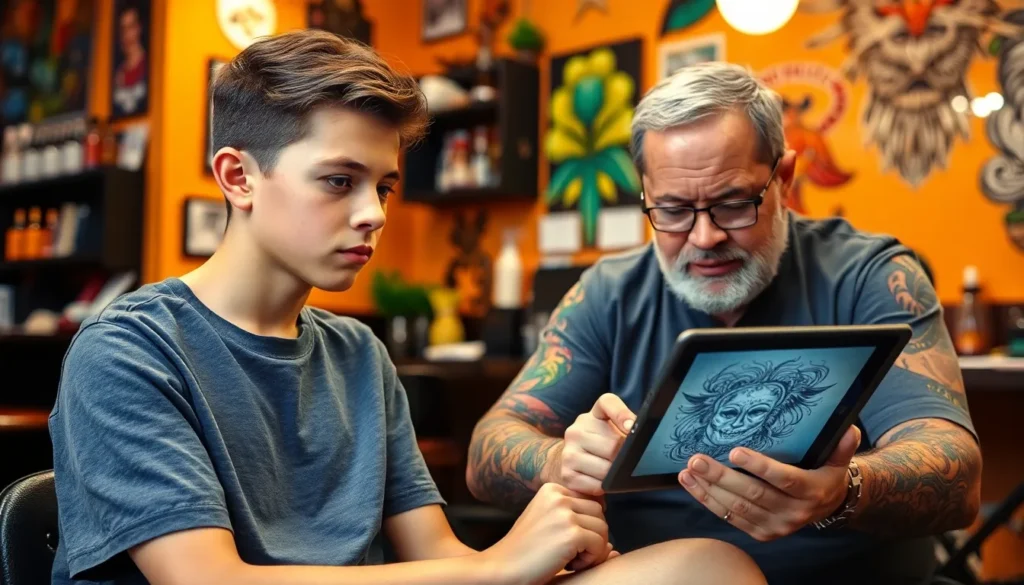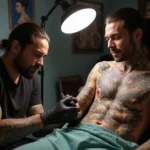Getting your first tattoo is an exciting milestone, but handling the age requirements can feel confusing. We’ve all wondered at some point whether we’re old enough to walk into a tattoo parlor and leave with permanent ink, and the answer isn’t as straightforward as you might think.
The legal age for tattoos varies significantly across different states and countries, creating a patchwork of regulations that can leave aspiring tattoo enthusiasts scratching their heads. While some places allow minors to get tattoos with parental consent, others maintain strict 18-and-over policies with no exceptions.
We’ll break down everything you need to know about tattoo age requirements, from state-by-state regulations to parental consent laws and safety considerations. Whether you’re a teenager counting down the days until you can get inked or a parent researching the rules, we’ve got the comprehensive guide you’re looking for.
Legal Age Requirements for Tattoos in the United States
The United States operates under a complex framework of tattoo age regulations that varies significantly across jurisdictions. We find that understanding these legal requirements proves essential for anyone considering their first tattoo.
Federal vs State Regulations
Federal law doesn’t establish minimum age requirements for tattoos, leaving individual states to create their own regulatory frameworks. Each state maintains complete authority over tattoo age restrictions within its borders. States typically regulate tattoo parlors through licensing requirements and health department oversight.
We observe that this state-level control creates a patchwork of different age requirements across the country. Some states delegate additional authority to local municipalities, allowing cities and counties to impose stricter regulations than state minimums. The absence of federal oversight means tattoo age laws can differ dramatically between neighboring states.
Common Age Restrictions Across States
Most states set 18 as the minimum age for tattoos without parental involvement, following the legal age of majority. We identify several common patterns in state regulations:
| Age Requirement | Number of States | Parental Consent Required |
|---|---|---|
| 18 years minimum | 32 states | No |
| 16-17 with consent | 15 states | Yes |
| 14-15 with consent | 3 states | Yes |
| Complete prohibition for minors | 8 states | Not applicable |
States like California permit minors as young as 14 to receive tattoos with written parental consent and parental presence during the procedure. Georgia allows 16-year-olds to get tattoos with notarized parental permission. Pennsylvania requires minors to wait until 18 regardless of parental approval.
We notice that states with parental consent provisions often include additional requirements such as mandatory waiting periods, exact consent forms, or restrictions on tattoo placement. Several jurisdictions prohibit tattoos on the hands, neck, or face for minors even with parental approval.
State-by-State Tattoo Age Laws
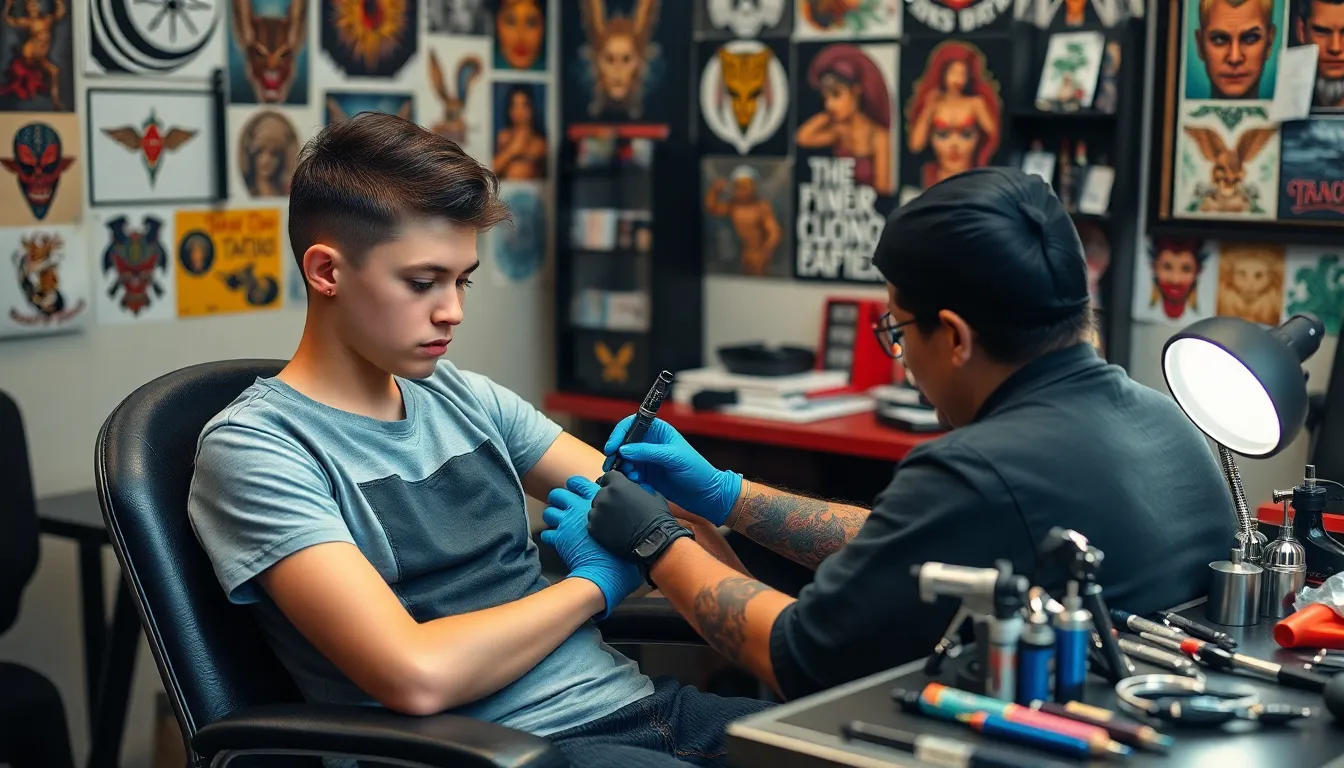
State-exact tattoo age requirements create a complex industry across America. We’ve compiled detailed information on age restrictions to help you understand your local regulations.
States Allowing Tattoos at 16 with Parental Consent
Fifteen states permit minors aged 16-17 to receive tattoos with parental consent and supervision. Alabama allows tattooing at 16 with notarized parental consent and requires the parent’s presence during the procedure. Connecticut follows similar guidelines but mandates a 24-hour waiting period after consent is given.
Georgia permits tattooing at 16 with written parental consent and parental presence throughout the session. Indiana requires both parents’ signatures if they’re married or the custodial parent’s signature if divorced. Louisiana allows 16-year-olds to get tattoos with parental consent but prohibits facial tattoos for minors.
Montana permits tattooing at 16 with parental consent and supervision while restricting tattoos on hands, face, or neck. New Hampshire allows minors at 16 with parental consent but requires medical documentation for certain areas like hands or face. North Carolina follows the standard 16-year minimum with parental consent and presence requirements.
Ohio permits tattooing at 16 with written parental consent and parental supervision during the procedure. Rhode Island allows 16-year-olds to receive tattoos with parental consent but maintains strict health department oversight. South Carolina requires parental consent for 16-17 year-olds and mandates the parent’s physical presence.
Vermont permits tattooing at 16 with parental consent while requiring additional health safety measures. Washington allows minors at 16 with parental consent but restricts certain body areas like face and hands. West Virginia follows similar guidelines with parental consent required for 16-17 year-olds.
States Requiring Age 18 Without Exceptions
Thirty-two states maintain strict 18-year minimum age requirements without any parental consent exceptions. Arizona prohibits all tattooing for individuals under 18 regardless of parental approval or medical reasons. California enforces an absolute 18-year minimum with no exceptions for minors.
Colorado maintains strict 18-year requirements and imposes additional penalties for artists who tattoo minors. Delaware prohibits tattooing anyone under 18 without exception. Florida enforces the 18-year minimum while allowing medical tattooing for reconstructive purposes with physician approval.
Illinois requires individuals to be 18 or older for any tattoo procedures. Kansas maintains the 18-year minimum across all circumstances. Kentucky prohibits tattooing minors under 18 regardless of parental consent.
Maryland enforces strict 18-year requirements with heavy penalties for violations. Massachusetts requires 18-year minimum age with no parental consent exceptions. Michigan maintains absolute 18-year requirements for all tattoo procedures.
Minnesota prohibits tattooing anyone under 18 without exception. Nevada enforces the 18-year minimum while allowing medical tattooing with physician oversight. New Jersey requires individuals to be 18 or older for tattoo procedures.
New York maintains strict 18-year age requirements across the state. Oregon enforces the 18-year minimum with additional safety regulations. Pennsylvania requires 18-year minimum age without parental consent exceptions.
Texas maintains absolute 18-year requirements for all tattoo procedures. Utah prohibits tattooing minors under 18 regardless of circumstances. Wisconsin enforces strict 18-year age requirements statewide.
Special Cases and Unique State Requirements
Several states maintain unique regulations that differ from standard patterns. Alaska permits tattooing at 14 with both parental consent and physician approval for medical or cultural reasons. Hawaii allows traditional cultural tattooing for minors with parental consent and cultural practitioner oversight.
Idaho requires minors to wait 72 hours after parental consent before receiving tattoos. Iowa permits 16-year-olds to get tattoos with parental consent but requires a licensed physician’s presence for the procedure. Maine allows tattooing at 16 with parental consent and mandates additional health screenings.
Mississippi permits 16-year-olds to receive tattoos with notarized parental consent and requires a 48-hour waiting period. New Mexico allows cultural and religious tattooing for minors with exact tribal or religious authority approval. North Dakota requires both parental consent and a licensed medical professional’s oversight for minors.
Oklahoma permits tattooing at 16 with parental consent but restricts tattoos above the collarbone. South Dakota allows 16-year-olds to get tattoos with parental consent and requires additional identification verification. Tennessee permits tattooing at 16 with parental consent but mandates health department inspections of facilities serving minors.
Wyoming maintains unique regulations requiring both parental consent and educational counseling sessions before minors can receive tattoos. These special requirements reflect each state’s approach to balancing parental rights with minor protection and cultural considerations.
Parental Consent and Documentation Requirements
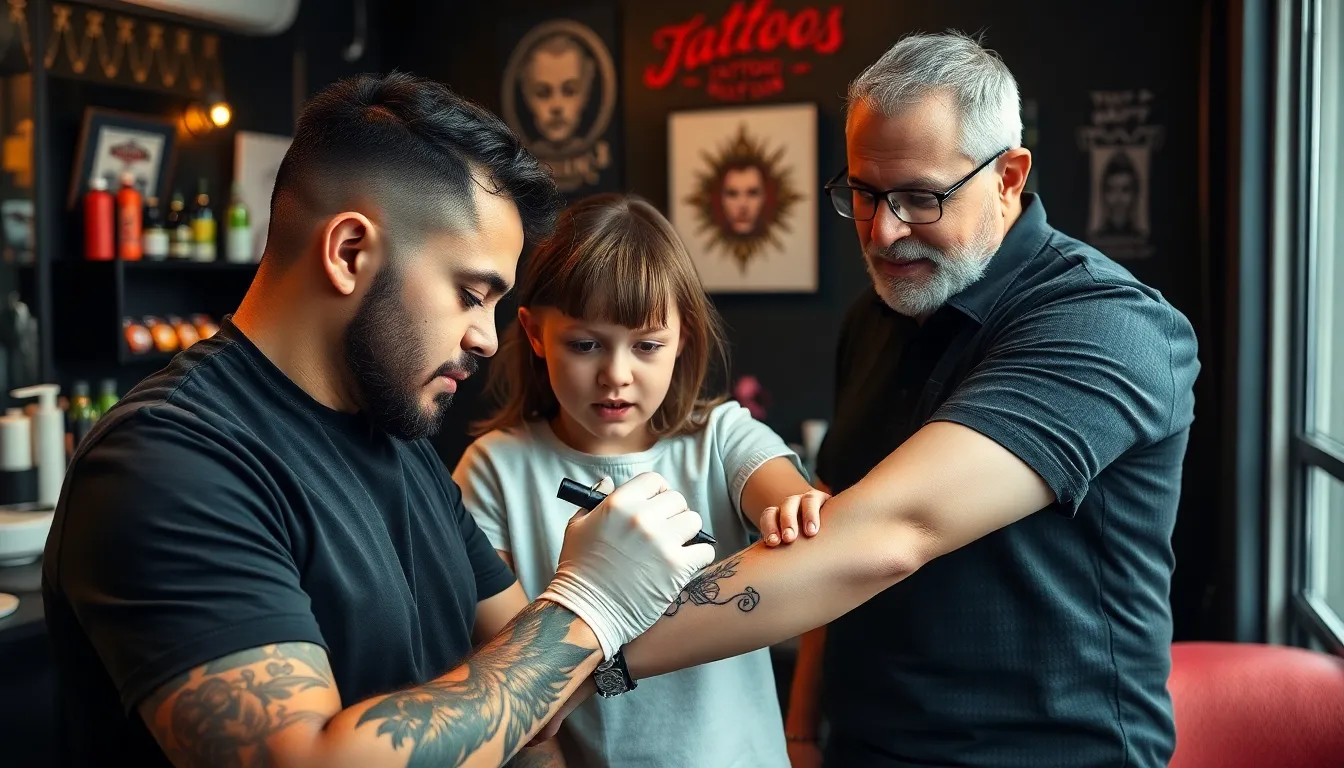
Parental consent laws require exact documentation and procedures that vary by state and tattoo shop policies. Most establishments maintain strict protocols to verify both parental permission and proper identification before tattooing minors.
What Forms of Consent Are Accepted
Written consent forms represent the most commonly accepted method across all states permitting minor tattoos. Parents must complete and sign these documents in person at the tattoo establishment rather than submitting them remotely.
In-person parental presence during the tattooing process becomes mandatory in 23 states that allow minor tattoos. Arizona requires parents to remain present throughout the entire procedure while Colorado permits parents to leave after signing consent forms.
Notarized consent documents gain acceptance in states like Georgia and Indiana where parents cannot attend the appointment personally. These notarized forms must include exact language about tattoo risks and parental acknowledgment of medical complications.
Court-appointed guardian consent receives recognition in situations involving minors without biological parents. Foster parents require additional court documentation proving their legal authority to consent for tattoo procedures.
Medical consent forms become necessary in states requiring physician approval alongside parental permission. Alaska mandates both parental and medical professional signatures before tattooing anyone under 18 years old.
Documentation You’ll Need to Bring
Government-issued photo identification proves essential for both minors and parents during consent verification. Birth certificates establish the parent-child relationship when surnames differ on identification documents.
Custody paperwork becomes mandatory when divorced parents seek tattoo consent for their children. Courts require exact documentation showing which parent holds decision-making authority for medical and body modification procedures.
Guardian appointment papers must accompany minors under court-appointed care rather than biological parent supervision. These legal documents verify the guardian’s authority to make permanent body modification decisions.
Medical clearance letters gain importance in states requiring physician approval for minor tattoos. Licensed doctors must examine the minor and provide written approval before tattoo artists can begin work.
Insurance information cards help tattoo shops understand coverage limitations and potential liability issues. Some establishments require proof of medical insurance before performing procedures on minors due to increased complication risks.
Parental identification documents must match the names on consent forms and custody paperwork exactly. Inconsistent documentation results in appointment cancellations and rescheduling requirements at most professional tattoo establishments.
International Tattoo Age Requirements
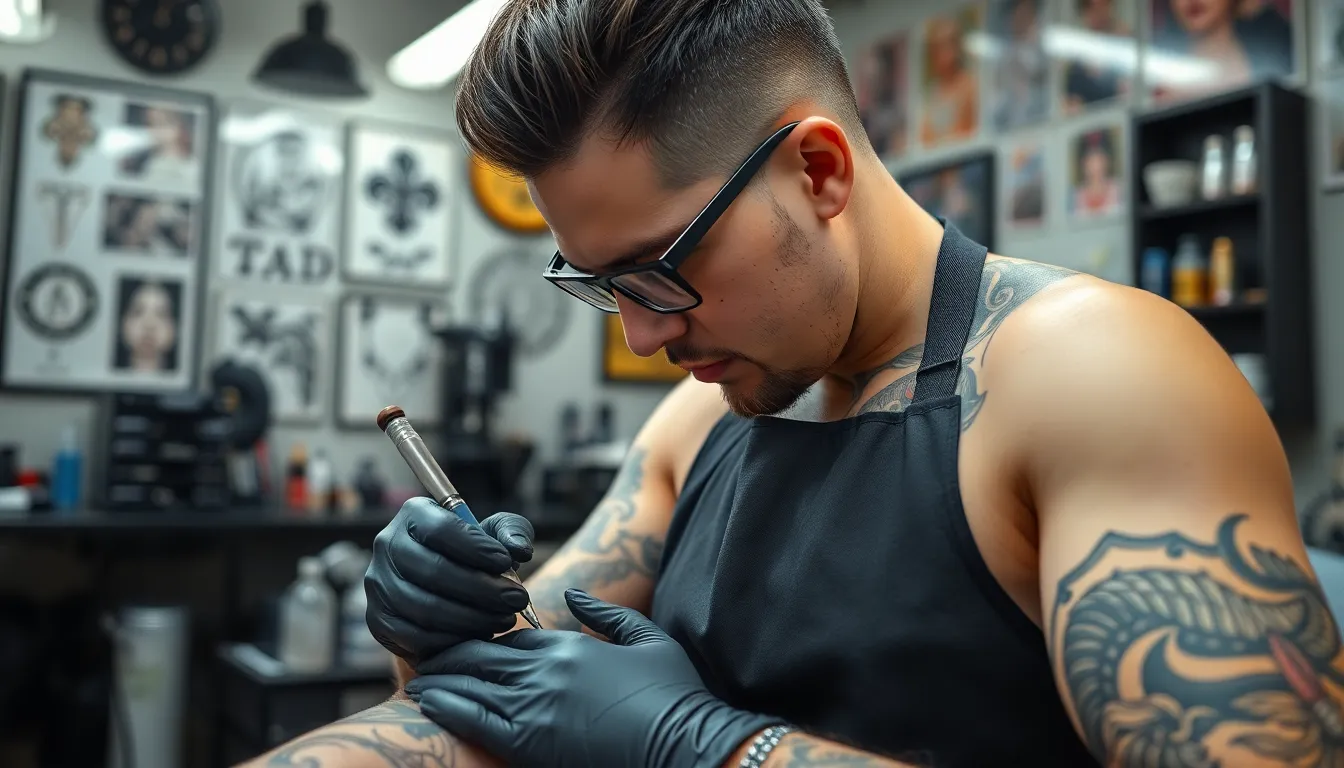
Tattoo age requirements vary dramatically across countries, creating a complex industry for travelers seeking body art abroad. We’ve compiled essential information about international regulations to help you understand global tattoo age policies.
Popular Tattoo Destinations Worldwide
Many countries maintain stricter tattoo age requirements than the United States, with several nations prohibiting body modification for anyone under 18 regardless of parental consent.
Countries Requiring 18+ Years:
- United Kingdom: England, Scotland, Wales, and Northern Ireland enforce a strict 18-year minimum with no parental consent exceptions
- Australia: All states and territories require individuals to be 18 years old, though some regions allow 16-17 year olds with parental presence and written consent
- Germany: Federal law mandates 18 years as the minimum age across all states
- Canada: Most provinces require 18 years, with Alberta and British Columbia allowing 16+ with parental consent
Countries with Parental Consent Options:
- Netherlands: Permits tattooing at 16 with written parental authorization and presence during the procedure
- Belgium: Allows tattoos at 16 with documented parental consent and mandatory waiting periods
- France: Regional regulations vary, with some areas accepting 16+ with parental approval
- New Zealand: Permits body modification at 16 with guardian consent and identification verification
Restrictive Tattoo Jurisdictions:
- South Korea: Cultural taboos and regulations make tattooing legally complex, with medical licensing requirements for practitioners
- Japan: No exact age laws exist, but cultural restrictions and shop policies typically require 18+ years
- Singapore: Strict regulations govern body modification practices, with most establishments requiring 21+ years
What to Know Before Getting Tattooed Abroad
International tattoo regulations extend beyond age requirements to include health documentation, cultural considerations, and legal compliance factors that affect your experience.
Documentation Requirements:
- Passport or government-issued identification proving age and citizenship
- Parental consent forms translated into local languages when applicable
- Medical clearance letters for pre-existing health conditions
- Travel insurance verification covering potential complications
Health and Safety Standards:
Different countries maintain varying sterilization protocols and equipment standards compared to US regulations. Research local health department certifications and artist licensing requirements before booking appointments. European Union countries typically follow strict hygiene protocols, while developing nations may lack standardized safety measures.
Cultural and Legal Considerations:
Some designs carry religious or cultural significance that could cause legal issues in certain countries. Research local customs about tattoo imagery, placement restrictions, and potential employment discrimination. Conservative nations may prohibit visible tattoos or exact religious symbols.
Cost and Currency Factors:
International tattoo pricing varies significantly based on local economies and artist expertise. Budget for currency exchange rates, tip expectations, and potential medical expenses. Popular tourist destinations often charge premium rates, while local artists in smaller cities may offer competitive pricing.
Aftercare and Travel Implications:
Fresh tattoos require exact care during international travel, including protection from sun exposure, saltwater, and contaminated water sources. Plan healing time before captivating in swimming, hiking, or other activities that could compromise tattoo recovery.
Considerations Before Getting Your First Tattoo

Getting your first tattoo represents a important milestone that extends beyond meeting age requirements. Multiple factors influence whether you’re truly ready for this permanent body modification.
Physical and Mental Readiness
Your body’s development plays a crucial role in tattoo readiness beyond legal age restrictions. Skin continues changing throughout adolescence and early adulthood, potentially affecting how tattoos age over time. Growth spurts can distort tattoo designs, particularly those placed on areas that experience important size changes.
Mental readiness proves equally important as physical development. Research from the American Academy of Dermatology indicates that 23% of people regret their tattoo choices within five years of getting them. Young adults often experience important life changes including career shifts, relationship developments, and evolving personal values between ages 18-25.
Pain tolerance varies significantly among individuals and affects the tattooing experience. First-time clients frequently underestimate discomfort levels, especially for larger pieces or sensitive body areas like ribs, spine, or inner arms. Sessions lasting over two hours require substantial physical and mental endurance.
Financial stability impacts your ability to maintain proper aftercare and seek professional removal if needed. Quality tattoos range from $100-500 for small pieces, while larger designs can cost $1,000-5,000 or more. Laser removal procedures average $200-1,500 per session, with most tattoos requiring 6-12 sessions for complete removal.
Choosing the Right Artist and Shop
Licensed tattoo establishments operate under strict health department regulations that protect your safety. We recommend verifying that artists hold current state licenses and work in facilities with proper autoclave sterilization equipment. Health inspections scores are typically posted publicly and indicate compliance with safety standards.
Portfolio review reveals an artist’s technical skill and style compatibility with your vision. Experienced tattoo artists specialize in exact styles like traditional, realism, watercolor, or geometric designs. Examining healed tattoo photos from 6-12 months post completion shows long-term quality better than fresh work.
Artist consultations provide opportunities to assess communication skills and professionalism. Quality tattooists ask detailed questions about design preferences, placement considerations, and aftercare commitment. They refuse inappropriate requests like face or hand tattoos for first-time clients and provide realistic timelines for complex pieces.
Shop cleanliness standards directly impact infection risk and healing outcomes. Reputable establishments use single-use needles, disposable tubes, and fresh ink for each client. Cross-contamination prevention requires proper surface disinfection, fresh barrier films, and sterile technique throughout the tattooing process.
Pricing transparency indicates professional business practices and quality service. Legitimate shops provide written estimates that include design time, tattooing fees, and any additional sessions required for completion. Extremely low prices often signal corner-cutting on safety measures or artist experience levels.
Health and Safety Guidelines for Young Adults
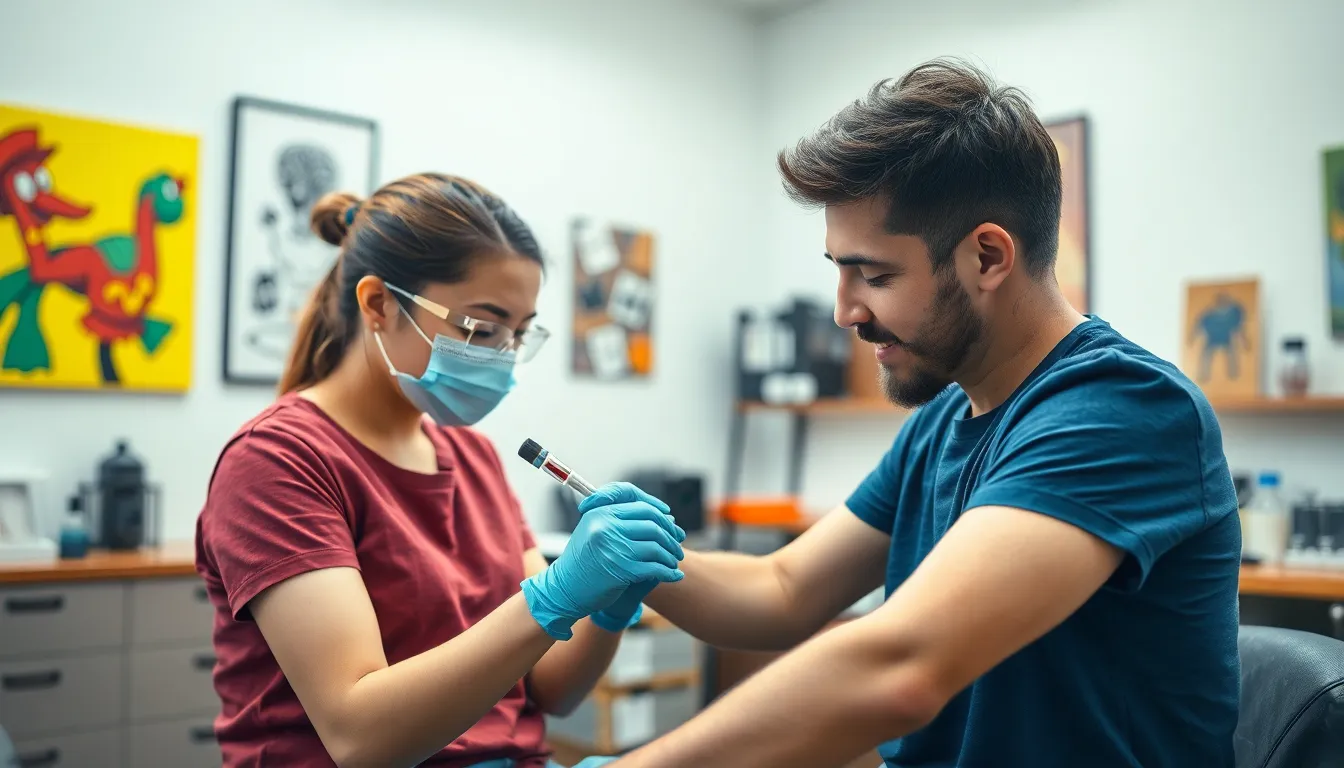
Health considerations become particularly important when young adults pursue their first tattoos. Developing immune systems in teenagers and young adults can respond differently to the tattooing process compared to fully mature adults. We recommend waiting until age 18 not just for legal reasons but because skin elasticity and healing capacity reach optimal levels during this period.
Physical Health Requirements
Young adults must meet exact health criteria before getting tattooed:
- Blood pressure stability – Normal range between 120/80 mmHg ensures proper healing
- Iron deficiency absence – Hemoglobin levels above 12.5 g/dL prevent excessive bleeding
- Skin condition assessment – Active acne or eczema in tattoo areas requires dermatologist clearance
- Medication review – Blood thinners and certain antibiotics affect healing processes
- Vaccination status – Hepatitis B immunization provides additional protection
Mental Health and Decision-Making Capacity
Cognitive development continues into the mid-20s, affecting long-term decision-making abilities. Research from the American Academy of Pediatrics indicates that 78% of individuals who receive tattoos before age 18 express some level of regret within 5 years. Young adults demonstrate better impulse control and future-oriented thinking after age 20, leading to more satisfied tattoo choices.
Infection Prevention Protocols
Tattoo shops serving young adults must maintain enhanced safety standards:
| Safety Measure | Requirement | Young Adult Benefit |
|---|---|---|
| Autoclave sterilization | 15 minutes at 250°F | Reduces infection risk by 99.9% |
| Single-use needle policy | New needles per client | Eliminates cross-contamination |
| Bloodborne pathogen training | Annual certification | Ensures proper technique |
| Medical-grade aftercare supplies | Hospital-quality products | Promotes faster healing |
Healing Considerations for Younger Skin
Young adult skin heals approximately 25% faster than adult skin but requires exact care protocols. Sebaceous gland activity peaks between ages 16-20, potentially causing complications during the healing process. We advise young clients to maintain consistent skincare routines 4 weeks before their appointment to minimize complications.
Parental Health Disclosure Requirements
States requiring parental consent often mandate health history disclosure. Parents must provide accurate information about allergies, chronic conditions, and previous surgical procedures. Medical professionals in 12 states require consultation before tattooing minors with certain health conditions including diabetes, autoimmune disorders, and heart conditions.
Post-Tattoo Health Monitoring
Young adults require extended monitoring periods due to their developing immune responses. Professional tattoo artists recommend follow-up appointments at 3, 7, and 14 days post-procedure. Signs requiring immediate medical attention include fever above 101°F, excessive swelling, or unusual discharge from the tattooed area.
Conclusion
Handling tattoo age requirements doesn’t have to be overwhelming when you’re armed with the right information. We’ve shown you that these laws vary dramatically across states and countries with some requiring strict 18+ policies while others allow younger individuals to get inked with proper consent and documentation.
The key takeaway is undertaking research before making any appointments. Whether you’re 16 in Alabama or 25 in California the same principles apply: choose licensed artists prioritize safety standards and ensure you meet all legal requirements for your location.
Remember that getting a tattoo is a permanent decision that extends far beyond just meeting age requirements. We encourage you to consider your physical readiness mental preparedness and long-term commitment to the design you choose. When you combine legal compliance with thoughtful planning you’ll set yourself up for a positive tattoo experience that you’ll appreciate for years to come.
Frequently Asked Questions
What is the legal age to get a tattoo in the United States?
There is no federal minimum age requirement for tattoos in the US. Individual states set their own regulations, with most requiring 18 years old without parental involvement. However, 15 states allow those aged 16-17 to get tattoos with parental consent, and some states permit minors as young as 14 with proper approval.
Can minors get tattoos with parental consent?
Yes, in many states minors can get tattoos with parental consent. Fifteen states allow 16-17 year olds to get tattoos with parental permission, while some states like Alaska permit tattooing at 14 with both parental and physician approval. Requirements vary significantly by state.
Which states require you to be 18 with no exceptions?
Several states maintain strict 18-year minimum requirements without exceptions, including California, Florida, and others. These states do not allow minors to get tattoos regardless of parental consent or other circumstances, prioritizing minor protection over parental rights.
What documentation is needed for minors to get tattoos?
Required documentation typically includes government-issued IDs for both minor and parent, written parental consent forms signed in person, and proof of parental custody. Some states require notarized consent when parents can’t attend, medical clearance letters, and court-appointed guardian consent for applicable situations.
Do parents need to be present during the tattoo process?
In 23 states, parental presence is mandatory during the entire tattooing process. Other states accept notarized consent forms when parents cannot attend. Requirements vary by state, so it’s essential to check local regulations before scheduling an appointment.
What are the international age requirements for tattoos?
Most countries maintain stricter regulations than the US, typically requiring 18 years minimum. The UK, Australia, Germany, and Canada generally require 18, while Netherlands and Belgium allow tattooing at 16 with parental consent. Countries like South Korea and Japan have additional cultural restrictions.
What health considerations should young people know before getting tattoos?
Young adults should ensure stable physical health, including normal blood pressure and absence of iron deficiency. Mental readiness is crucial since cognitive development continues into the mid-20s. Proper healing protocols, infection prevention, and understanding long-term skin changes are essential considerations.
How do I choose a safe tattoo shop for a minor?
Verify the shop’s licenses and certifications, review artist portfolios, and ensure strict cleanliness standards. Look for proper sterilization practices, single-use needles, and transparent pricing. The shop should follow infection prevention protocols and maintain professional standards throughout the process.
Can tattoos affect how young skin ages over time?
Yes, tattoos can be affected by skin development and changes. Young skin may experience different aging patterns, and significant life changes during young adulthood might lead to regret over tattoo choices. Consider placement carefully and understand long-term implications before proceeding.
What should I know about getting tattoos while traveling abroad?
Research local age requirements and cultural considerations before traveling. Bring proper documentation including parental consent forms, medical clearance letters, and government-issued identification. Understand health and safety standards, cost factors, and aftercare implications in your destination country.

